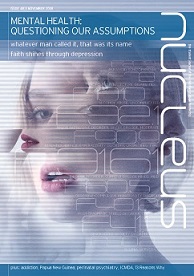What contributions have Christians made to mental health? For so much of history, those with mental health issues have often been poorly treated: chained like animals and locked in cages. Tragic stories of ostracisation and stigma scar our history books. Things have changed, but there is still much to do.
The Seventh Earl of Shaftesbury, Anthony Ashley-Cooper (1801-1885) is often considered one of the most important figures in 19th century British psychiatry for his political work reforming the mental health laws of his era. Interestingly though, this is probably not what he is best known for. (1)
He was a devout, evangelical Christian and this faith can be traced back to the kindness and witness of a maid, Maria Millis and his sisters. They were a stark contrast to his parents' absenteeism and lack of affection. Millis showed him a model of Christian love that formed much of the basis of his social activism and philanthropy. (2) He felt called to 'devote whatever advantages he might have bestowed…in the cause of the weak, the helpless, both man and beast and those who had none to help him'. He lived up to this gaining the nickname 'the poor man's Earl' among his parliamentary colleagues. (3)
In 1844, he brought forward a motion asking Queen Victoria to take into consideration the report of the Metropolitan Commissioners of Lunacy, of which he was a contributor. He ended his motion with these powerful words that echo the justice of Proverbs 31, (4) the human dignity of Psalm 139 (5) and highlight the driving force behind much of what he did. 'These unhappy persons are outcasts from all the social and domestic affections of private life…Their condition appeals to our highest sympathies. Majestic, though in ruin… the motion is made on behalf of the most helpless, if not the most afflicted, portion of the human race'. (6)
The Earl of Shaftesbury was thoroughly committed to seeing improvement in provision for and care of those with mental health issues. He was consistently advocating for their rights, arguing for early treatment and praising non-restraint. Although bringing several acts to Parliament from 1845 to 1862, his work did not go unchallenged. This led to personal doubts and anxieties. He worried that the 'labour, the toils, the anxieties, the prayers of more than fifty years….in one moment [could be] brought to naught'. (7)
For our next hero, Rev Dr Chad Varah (1911-2007), one moment would have a profound effect on his life. In 1935, he took his first funeral — a 13 year-old girl who had committed suicide. She thought she had contracted a sexually transmitted disease and was destined to die a slow, painful and shameful death. The sad reality is that she had in fact started her period. On that day, Varah committed himself to helping people like her overcome the isolation and ignorance that had led to this tragedy.
Although Varah had some unorthodox views on reincarnation and pornography, he stuck to his graveside vow. Greater London in the 1950s, typically saw three suicides take place a day. This appeared to him to be a great need not be being met by healthcare professionals and social workers. He was initially reluctant to fill this need and worried how he would support his young family if he did. In his autobiography he wrote: '"There ought to be an emergency number for suicidal people," I thought. Then I said to God, "Be reasonable! Don't look at me… I'm possibly the busiest person in the Church of England… It'd need to be a priest with one of those city churches with no parishioners"'. Shortly afterwards, he was offered the rectorship at St Stephen Walbrook in London — just such a church. (8)
In 1953, he set up a phone in the crypt of the church with the number MAN 9000 (MAN for Mansion House where the church was based) with the aim of 'befriend[ing] the suicidal and despairing'. This organisation was named the Samaritans. The first phone used can still be seen on display in the church today. It was the first 24-hour helpline in the world. Since then the organisation has grown significantly. The Samaritans have over 20,000 volunteers at 201 branches across the UK and Ireland who answer a call, email or text every six seconds. (9) Varah said: 'Little girl, I didn't know you, but you have changed the rest of my life for good.' (10)
Another force for change is our third hero, Dr Kaaren Mathias, who at this year's ICMDA World Congress was awarded the ICMDA 'Right to Dignity and Health Award'. She is the director of Project Burans based in the rural northern Indian district of Uttarakhand. Dr Mathias thought she was going to India to work in child and maternal health, but much like Shaftesbury and Varah she saw the desperate abandonment of people with psycho-social disability and mental health problems and felt called to action.
Mental health disorders account for 11.8% of healthcare needs in India, yet mental health services are allocated less than 1% of the national health budget. Uttarakhand has one specialist psychiatric hospital and seven government psychiatrists for a population of more than 10,000,000. One in 100 people with depression in Uttarakhand seek help from mental health services. Most treatment decisions are medication; almost none access counselling or talking therapy services. (11)
Burans was set up in 2014 with the aim of 'working with communities to improve mental health care'. The project is led by the Emmanuel Health Association (EHA) who work 'in the name and spirit of Jesus Christ so as to manifest him through word and deed'. (12), (13)
Dr Mathias is a New Zealander (though born in India to missionary parents) with a background as a public health physician. None of her 18-person team are mental health specialists, but they employ a diverse range of strategies to engage community members with issues of mental health.
In just three years, Project Burans has identified more than 650 people with psycho-social disabilities and brought then for mental health treatment. They have formed multiple support groups for people with psycho-social disabilities and their caregivers. They have begun resilience groups for girls at government schools and for girls who have dropped out of school. Community health and development workers from 50 Christian NGOs and over 800 government community health workers in mental health have been trained. They have provided leadership and training for over 400 church leaders and workers.
Their website is full of success stories, including people like Savita who had been struggling with depression for six months. She had been unable to cook food, wash clothes or even leave the house. A local community worker from Burans started visiting her weekly, listening to Savita and providing counselling. She was taken to her local doctor where she was started on anti-depressants. All these interventions transformed her life. She now receives guests to her house with a big smile and has resumed her responsibilities at home and beyond. (14)
Dr Mathias reports that there is still much to do, particularly around the areas of suicide and alcoholism, but her faith gives her hope and persistence to keep going. She writes: 'Grace is everywhere in the reign of God. Knowing that each person we work with (even the seemingly unbudging officials) are made in the image of God is something that is easy to overlook…When Jesus meets and talks with the woman from Samaria at the well, he takes time to talk to and encourage someone on the edges of her community — and then says "if you knew the gift of God..." I feel that so often we have a very limited and narrow understanding of God's work and the ways God brings welcome to each person.'
As these three heroes have exemplified, all too often, we can see the immense need for healing and ultimately salvation through Jesus and the opposition to that, and despair. I leave you with Shaftesbury's Christmas 1851 diary entry: 'What gained for the cause of our blessed Master? Whatever little, if any, has been achieved, it has been by God's own grace. To Him then be all the glory! … Few can know the troubles I have endured: the sorrow of mind, the weariness of body; the labour I have undergone by day and by night; the public and private conflicts; the prayers I have offered, and the tears I have shed. Here, however, is my consolation, that, amidst frailties and sins, trespasses and shortcomings, I have had one single object perpetually before me. It was God's grace that gave me the thought; God's grace that has sustained me hitherto, to have, in truth, but one end, the advancement of his ever-blessed name, and the temporal and eternal welfare of all mankind...Sursum corda [lift your heart].' (15)
As you read this, perhaps God is calling you to be the next mental health hero, calling you to meet some unmet need in the UK or abroad. Remember, 'we are God's handiwork, created in Christ Jesus to do good works, which God prepared in advance for us to do.' (16)
Rachel Owusu-Ankomah is CMF Head of Student Ministries and a surgical doctor in London
lessons from mental health heroes
- The opposition to Christianity and the fight for justice can be overwhelming. This is God's work that he graciously allows us to be part of and he will supply our needs as we serve him.
- All too often, big impact projects start off as small, simple ideas. What simple ideas do you have that use your skills, gifts and opportunities to honour God?
- There is immense need for healing and ultimately salvation through Jesus in this world. Where is God calling you to serve him and build his kingdom?
































